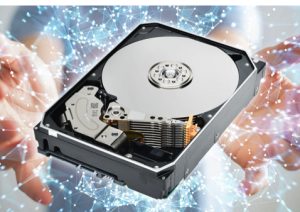Dispelling 4 Common Misconceptions About HDDs
Don't deliver state-of-the-art performance, shorter service life, consume lot of electricity, yesterday's technology.
This is a Press Release edited by StorageNewsletter.com on July 21, 2023 at 2:02 pmBy Toshiba Electronics Europe GmbH
HDDs have now disappeared from most computer terminals, but it would still be wrong to regard this classic form of storage as obsolete.

After all, many prejudices that have developed over recent years do not hold up on closer consideration.
Toshiba dispels the most widespread misconceptions:
HDDs do not deliver state-of-the-art performance
An enterprise HDD drive with 250MB/s and 400 IO/s certainly cannot keep up with a single enterprise SSD, which transfers around 2,500MB/s and achieves 100,000 IO/s. However, unlike in computers, storage systems used by companies, cloud providers and hyperscalers do not contain just one storage medium in any one case – storage arrays are usually equipped with several dozen drives. In such a network, HDDs manage over 5GB/s and more than 10,000 IO/s, sufficient for many modern applications. Since their unit costs are lower than those of SSDs, it is also more economical to equip the systems with many HDDs rather than a few SSDs.
HDDs have a shorter service life
The HDD mechanical elements, with their moving parts, are often said to cause high wear on HDDs. However, they do not fail more quickly or more often than SSDs – MTTF of most HDD and SSD models in the enterprise is 2.5 million hours, which equates to an annualised failure rate (AFR) of 0.35%. In a data processing centre with 2,000 drives, this means that, in statistical terms, companies need to replace 7 HDDs per year. To avoid a higher figure, they should make sure that they observe the ambient conditions specified by the manufacturers, such as temperature and vibrations, and use the HDDs in accordance with their intended purpose. Desktop HDDs are not designed for 24/7 operation, and with the high workloads in a server or storage system, they wear out quickly. Generally, they cope with a workload (rated workload) of 55TB per year, while NAS HDDs can cope with 180 and enterprise HDDs as much as 550TB per year.
HDDs consume a lot of electricity
The HDD’s mechanics are also often rated negatively in terms of power consumption, but modern drives with helium filling are pretty frugal. Since most of the energy is used to rotate the spindles, their power consumption is about 7 to 8W, regardless of capacity and workload. SSDs which provide a similar amount of storage capacity as HDDs require just as much, if not more, power for the same data throughput. However, their power consumption depends directly on the capacity, whereas HDDs always have a specific base power consumption for spindle rotation. SSDs, therefore, score well at capacities below 1TB, which is the case in most portable and battery-powered devices.
HDDs are yesterday’s technology
In terms of basic technology, HDDs may not have changed since their early days, but the components, materials and recording methods are constantly evolving. As a result, the storage capacities of the drives have been increasing by about 3TB per year for some time now, with the costs remaining unchanged. In 2021 the first models using the new MAMR (Microwave Assisted Magnetic Recording) recording method came onto the market. Here, microwaves at the write head control and concentrate the magnetic flux so that less energy is needed to magnetise the bits. Consequently, the write heads can be smaller and write data more densely. According to experts, the further development of MAMR will increase the capacities of HDDs to up to 50TB in the next few years.
“There is no reason to dismiss HDDs because the technology is and it is impossible to imagine data centres, cloud infrastructures and NAS systems without it. This is also clear from the consistently high sales figures of more than a quarter of a billion drives per year,” emphasises Rainer W. Kaese, senior manager business development storage products, Toshiba Electronics Europe. “The usual prejudices vs. HDDs can easily be refuted, and given rapidly growing data volumes, HDDs will be with us for a long time yet. No other storage medium offers such high storage capacities at such low costs – today, and in the future.”














 Subscribe to our free daily newsletter
Subscribe to our free daily newsletter

